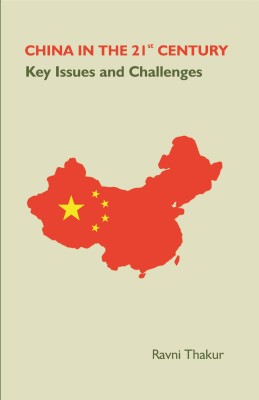CHINA IN THE 21st CENTURY(Paperback, Ravni Thakur)
Quick Overview
Product Price Comparison
ABOUT THE BOOKChina under President Xi Jinping has emerged as a major world power and a country that is ready to challenge the status quo in its near neighborhood and beyond. Yet, the internal workings of China, its politics and society remain remote and largely unknown. This collection of articles is especially designed to introduce the reader to China's domestic reality . The book highlights key issues on politics, society and foreign policy in China, thus providing an overview of China today.Divided into two parts, the first section deals with the changes in Chinese political economy since the rise of President Xi Jinping in 2012. A look at key features of Xi Jinping thought helps us identify the main thrust of China's key domestic policies. President Xi's impact on foreign policy is showcased and the BRICS forum and the One Belt One Road policy discussed in detail.These are policies that directly impact India and its own foreign policy.In Part II, the author focusses on three key issues of political economy by including articles on the increasing social and economic inequalities that have emerged under the economic market reform process. These contradictions pose a considerable political challenge to the legitimacy of the Chinese communist party. The regional and ethnic challenges facing the Chinese government are addressed by looking at development policies and economic growth in Tibet. Two separate articles look at the lives of Chinese youth and Chinese women. These show how economic change has transformed the avenues available for youth and women in China and also their own search for meaning and identity. Overall, the book provides us with a comprehensive overview of current social and political realities of China under Xi Jinping and is a must read for those interested in contemporary China and its geoeconomics. ABOUT THE AUTHORDr . Ravni Thakur is currently a tenured Professor for Chinese Studies at the Dept. of East Asian Studies, University of Delhi where she was Head of the Department. She has been a student at the Language Institute in Beijing (1982-83) and at the Beijing University (1983-84). Since then, she has visited China regularly,worked in China and traveled extensively within China.She has a M.A. in Development Studies from the Institute of Social Studies, The Hague and a Ph.D. from the Sinology Institute, University of Leiden. She has taught at the INALCO, Sorbonne before her return to India in 1997. She has also been Professor for Chinese Studies at the Jamia Millia Islamia and Fellow of the Delhi Policy Group. She is a widely published author and commentator on China with several articles and books to her credit. She has lectured extensively across universities and thinktanks in India and China and participated regularly in international conferences in her field.Prof. Thakur speaks fluent Chinese and has been a frequent freelance interpreter and consultant for Indian and Chinese businesses and other delegations. CONTENTSIntroduction......................................................................................................9PART - I: Ideology and Key International Policies...........................................17I. Xi Jinping and his Thought: The New Ideological Orthodoxy.........................19II. Foreign Policy and the One Belt One Road Initiative....................................43III. Theorising BRICS and its Cooperative Agendas.........................................65PART - II: Emerging Social Issues....................................................................85IV.The Dynamics of Social Stratification in China..............................................87V. Rethinking Development: A Review Article on Tibet and Xinjiang...............117VI. Questioning the Practices of Patriarchy: WomenŌĆÖs Studies in China...........135VII. A Critical Nationalism: Youth in China.....................................................153Conclusion......................................................................................................167Appendix : Understanding India-China Relations A Personal Perspective..........179Index..............................................................................................................193


